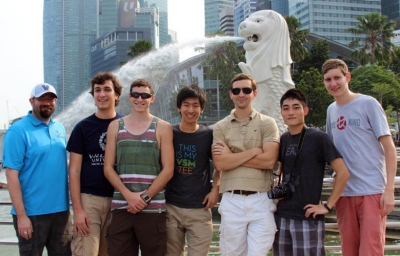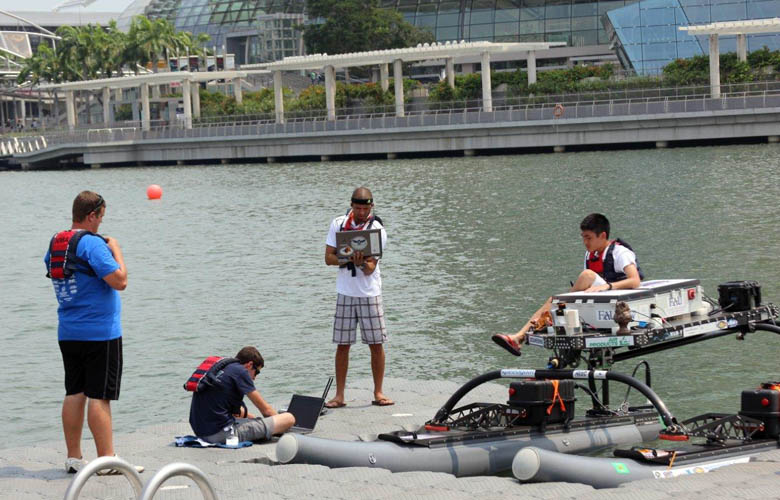RobotX Challenges Provides Unforgettable Experience for Villanova Engineers

Members of Team WORX in Singapore: Garrett Clayton, associate professor of Mechanical Engineering; graduate student Anderson Lebbad ’12 ME; Dylan DeGaetano ’16 ME; Ed Zhu ’16 ME; graduate student J. Wes Anderson ’13 ME; Gin Cheng ’15 CpE; and Mike Benson ’15 ME.
It was just a year ago that Villanova University and Florida Atlantic University (FAU) learned that together they had been selected as one of three teams to represent the United States in the inaugural Maritime RobotX Challenge in Southeast Asia. Over those 12 months, students from both engineering programs were charged with outfitting a Wave Adaptive Modular Vessel (WAM-V) capable of intelligently navigating the seascape of Marina Bay, Singapore. With a long list of project details to address, that year passed quickly. On October 27, 2014, representatives from Team WORX—(Villanova) Wildcats, (FAU) Owls, RobotX—returned home after 10 days, having won four awards in this unforgettable maritime robotics endeavor.
On October 18, six Villanova students arrived in Singapore with team leader Dr. C. Nataraj, professor and chair of the Mechanical Engineering Department, and Dr. Garrett Clayton, associate professor of Mechanical Engineering. The group had one day to adjust to the 13-hour time difference and become better acquainted with their FAU teammates before it was time to unpack and assemble the super structure of the WAM-V and prepare for upcoming practice tests later in the week. The three days that followed were spent mounting hardware components, testing systems, collecting field data, and practicing for qualifying runs. Each of the 15 international teams—three each from Australia, Japan, Singapore, South Korea and the United States—also had problems to fix that kept the students working throughout the night.

WAM-V preparations on Marina Bay, Singapore.
It was mid-week when Team WORX won its first award—first place and a $5,000 prize for Land Based Judging. “The judges looked at each boat’s design, control systems, software, and basically the science behind the work,” explains Dr. Nataraj. “In my opinion, this was really one of the most important aspects of the competition. To have placed first in the static judging tells me that if a company had to choose one boat to replicate, it would likely be ours. Hardware issues can be fixed, as long as the science is sound.” In addition to this award, Team WORX placed first and received $1,000 for its website and its design presentation. It also won a $500 special prize for “learning the difference between theory and practice.”
Qualifying rounds for the competition finals took place Thursday through Saturday. Although Team WORX performed extremely well on day one, it did not ultimately make it to the final round, which the judges limited to the top two teams from each country. “I believe that the extreme heat and humidity affected the hardware,” says Dr. Nataraj. “The equipment would work for a short amount of time and then fail. We weren’t able to adjust to the weather conditions.” Thorough stress testing and designing a diagnostic mechanism are on the list of things that Dr. Nataraj and the team will need to address for the next RobotX Challenge, which is tentatively scheduled for 2016 in Hawaii.
Dr. Nataraj also would make one adjustment to the composition of the team itself: “Next time I will consider adding a doctoral student to our group, primarily for the continuity he or she can provide. It’s very difficult to start over each year with new students who have not been through the experience before.” Reflecting its commitment to undergraduate education, Villanova’s team was comprised of sophomores, juniors and seniors, and only two master’s level students. This was in sharp contrast to some others whose teams were almost entirely made up of post-doctoral researchers. Dr. Nataraj says the majority of Villanova team members will continue to be undergraduate students: “I’m very proud of our Villanova students, as undergraduates they performed at a graduate level. It is a fabulous experience for them to have, working on a problem of such extraordinary complexity.” Three journal papers reported the project’s research results and were co-authored by the students.
When asked what he took away from the experience, graduate student Anderson Lebbad ’12 ME references the professional nature of project: “It was a fantastic opportunity to work collaboratively both with our classmates here at Villanova and our teammates in Boca Raton, Florida. We all learned what a real project is like. We had to make sure our project was on schedule, and that we properly allocated our time and budget.” On the topic of finances, Dr. Nataraj expressed his appreciation for the team’s sponsors. “The eight-month project cost approximately $350,000, and that’s not including faculty time,” he says. “We couldn’t have done it without the financial and in-kind support of numerous companies and organizations.”
Given the difficulty of summarizing in one article nearly a year’s worth of work and 10 days in Singapore, Team WORX recommends checking out its RobotX website. Visitors will find a list of the team’s sponsors, a gallery of videos and photos, competition rules and details, the science and engineering behind the project, and profiles of team members.
